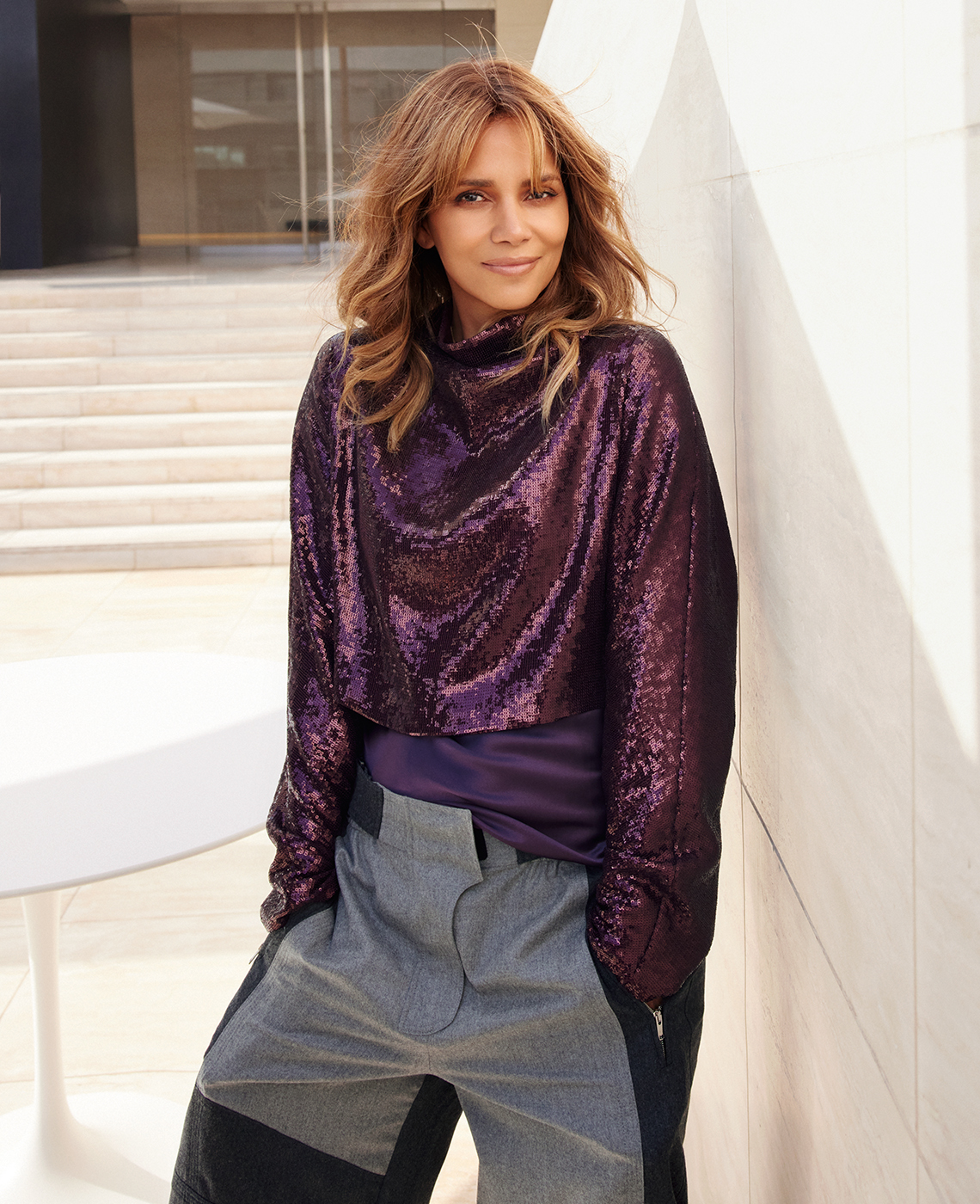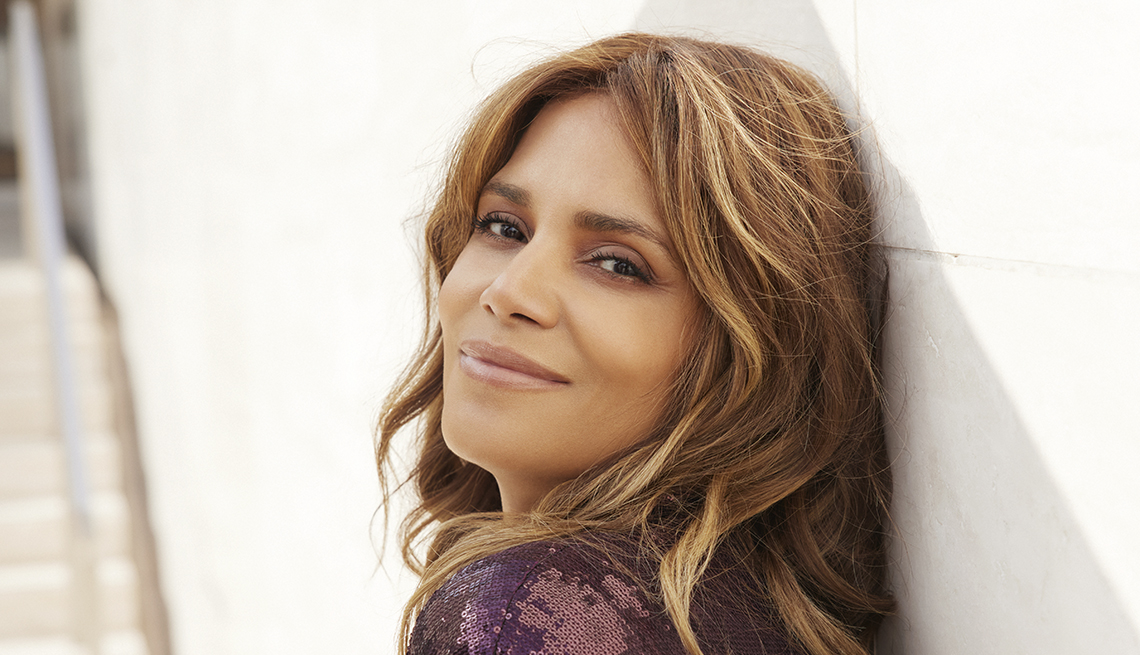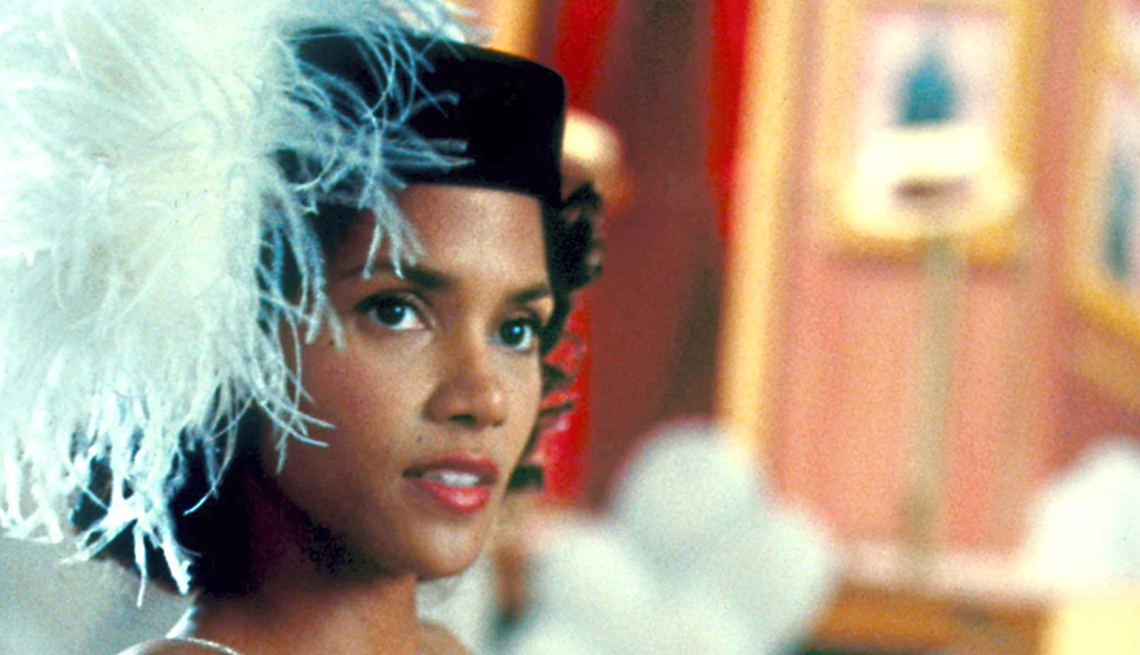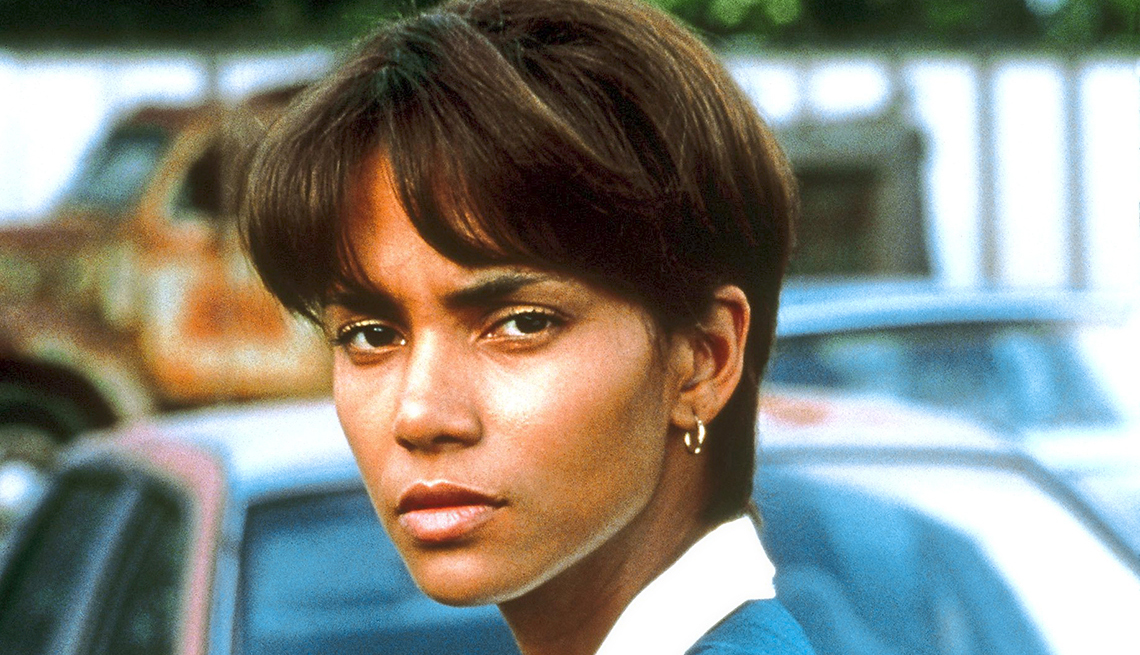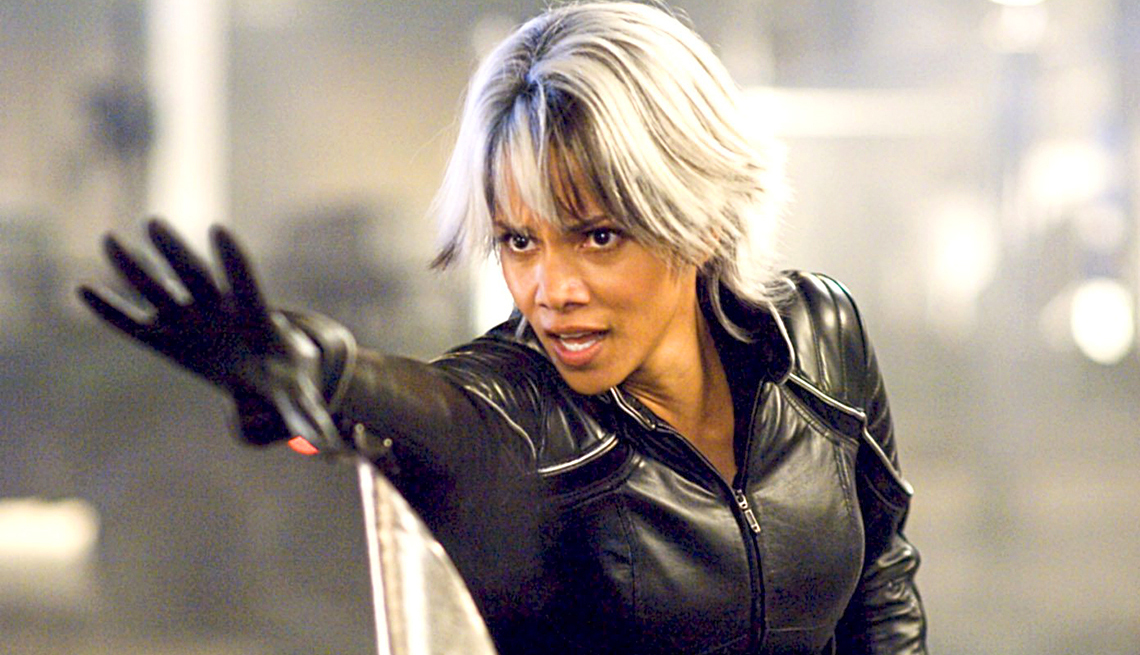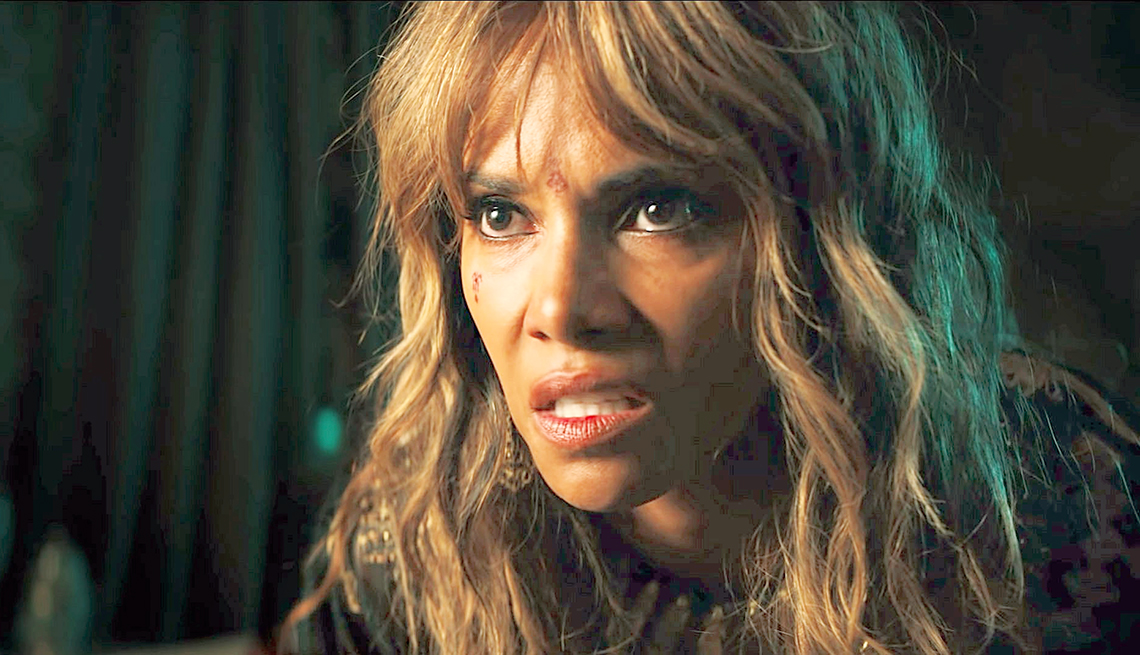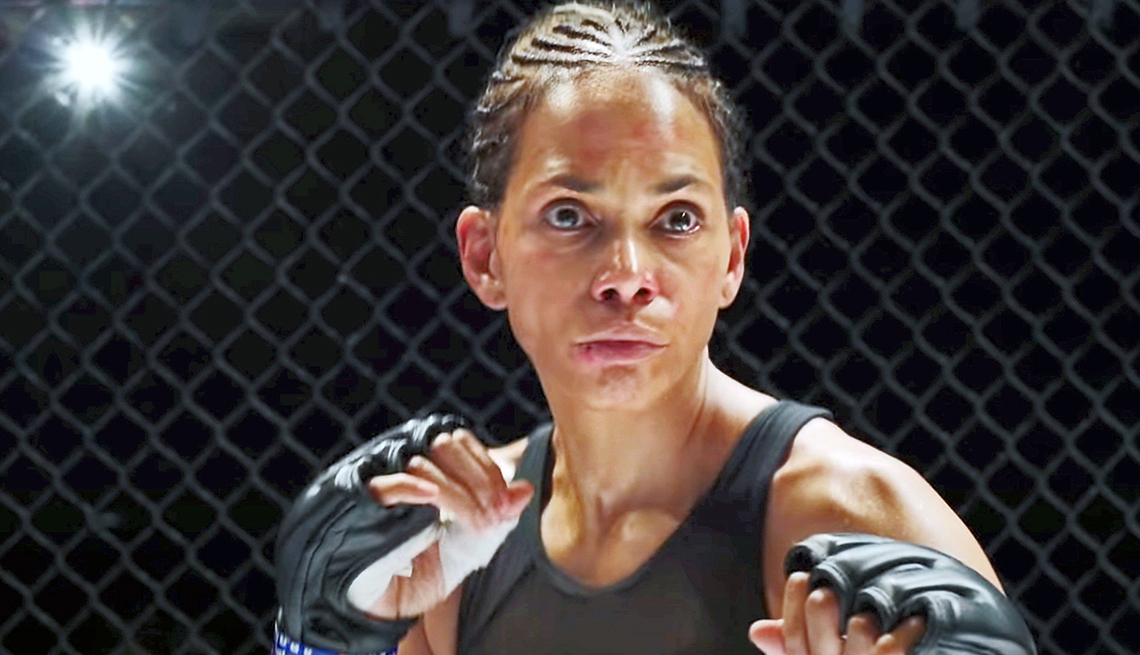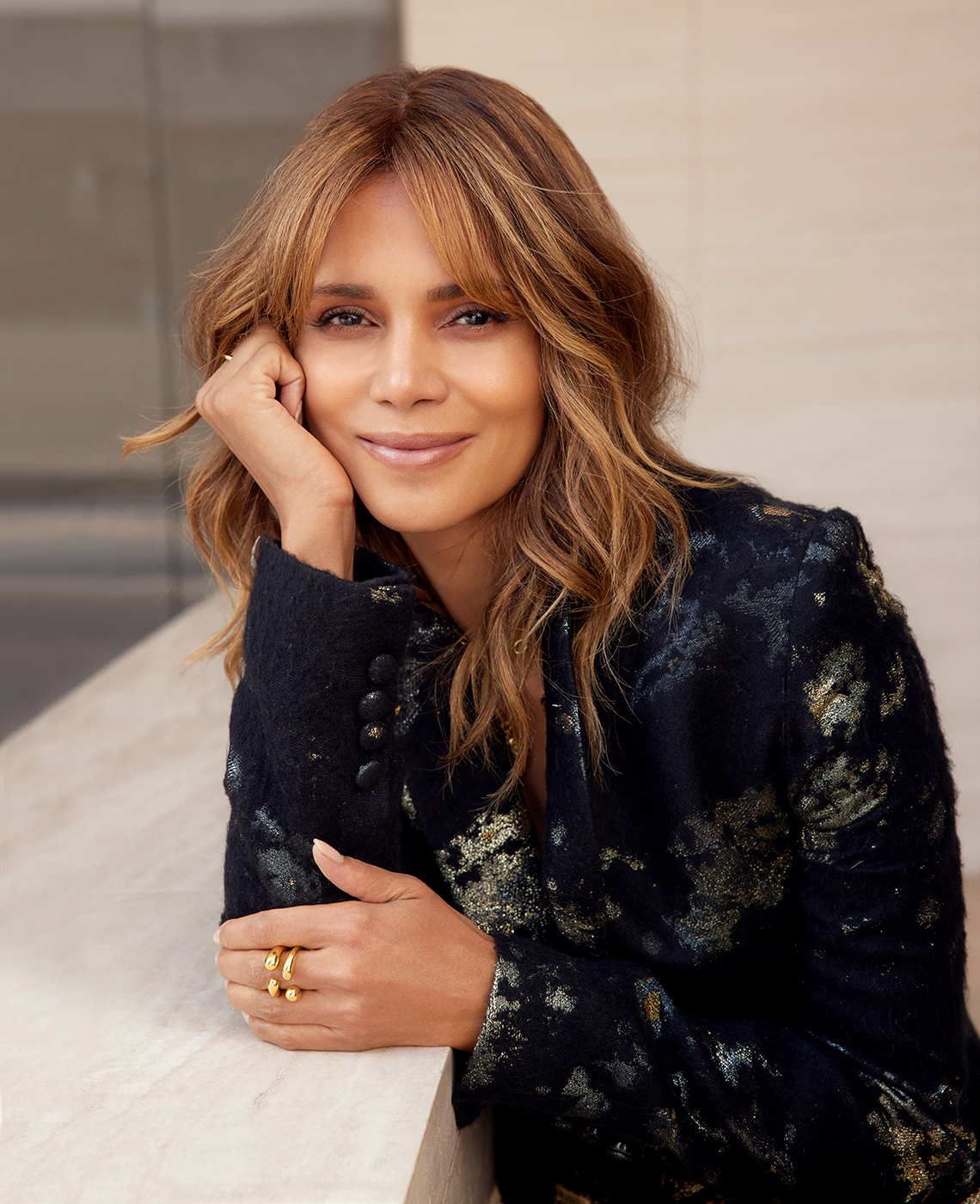How Halle Berry Found Her Groove
The actress-director has had career success and family fulfillment, but never at the same time until now
If you’re a man reading this, be forewarned: Halle Berry and I are in the middle of some frolicking, giggle-inducing, straight-from-the-heart girl talk. And at least one of us (me) is discreetly sipping a Sex and the City cosmopolitan.
“It’s, like, a guy could be a good kisser, right?” I’m saying. “And then you end up staying with him for 10 years, just because of that!”
Berry nods, vigorously — a knowing nod that shakes her gold-streaked mane.
“And not just with him,” she adds, all riled up. “But stuck. Because now you’re in something.”
This is my first chat with the Oscar-, Emmy- and Golden Globe–winning actress, via long-distance Zoom because of these pandemic times. But even though we’re virtual strangers, Berry’s the kind of woman who connects with her fellow tribeswoman instantly — and isn’t afraid to dive into the nitty-gritty.
After our talk about the ghosts of bad boyfriends past, I bring up a heartbreaking scene halfway through her new film, Bruised, and we are very quickly near tears. In the scene, her character, down-and-out mixed martial arts (MMA) fighter Jackie Justice, is walloped against the wall by her abusive boyfriend as her young son watches. It’s the kind of domestic abuse Berry experienced as a child — watching her alcoholic father strike her mother — and as an adult, too.
“So many women will relate to it,” I say.
“I know,” Berry says, giving another nod.
And minutes later, we’re revved up again. Because even though the film — her directorial debut — is grim and violent at times, it’s also packed with love, enlightenment and, ultimately, hope. It ends with a career revived, a family reconfigured and a woman triumphant — eerily echoing Berry’s life today.
“I believe in destiny. But we have to do our part to realize that destiny. I don’t think things that are destined are going to happen if you sit and do nothing.”
Speaking from her home in Los Angeles, Berry, 55, is the picture of contentedness — with work, motherhood and, finally (and for the first time meaningfully, she says), love. Wrapped in a soft, green sweater and surrounded by tropical plants (deep green Monstera deliciosas, to be precise), she is gracious, funny, warm and vulnerable. Makeup-free and hair tousled after a day of back-to-back errands, meetings, interviews and mom duty, she is nevertheless luminous.
And smiling, with good reason. In the middle of a whirlwind PR tour for two films (in Moonfall she plays a NASA executive), Bruised blasted to number 1 on Netflix after its debut in November. Days later, Berry inked a multi-film deal with the streaming company to star in and produce more films.
Like her underdog character, Jackie Justice, Berry fought hard to reach this beautiful place in her life.
Growing up in Cleveland, her parents — dad was Black and mom, white — divorced when she was 4, and she was raised by her mother, a psychiatric nurse, who moved Berry and her older sister to an all-white neighborhood and schools. A white woman on her own with two biracial kids in the late ’60s was a challenge, but “my mother was this super strong, warrior woman,” Berry says.
And so is her daughter. A driven, determined teen, Berry was a high school honor student, prom queen and beauty contestant who dabbled in broadcast journalism at Cleveland’s Cuyahoga Community College before pulling up stakes and eventually moving to New York, in 1989, to pursue her acting dream.
Wary of being typecast for her looks, her film debut in 1991’s Jungle Fever came after she wiped off her makeup and told director Spike Lee she wanted the “crack ho” part in the film instead of the sophisticated wife she was auditioning for.
For the next two decades, this became Berry’s professional mandate — mining roles meant for women with lighter skin or less striking features and making them her own.
“Halle is fast on her feet, operating on the edge of instinct,” her boyfriend, musician Van Hunt, wrote on Berry’s website, Rē-spin. (Grammy-winning Hunt wrote the title song for Bruised.) “She is what Toni Morrison called an outlaw woman.”
Berry worked steadily in the ’90s, gaining critical notices as a substance-abusing mother in Losing Isaiah and an activist in Warren Beatty’s political satire, Bulworth. When she realized she could produce the roles she wanted herself, she co-executive produced the 1999 HBO film Introducing Dorothy Dandridge and portrayed the nightclub crooner and first African American to be nominated for a best actress Oscar in 1954.
A sign, perhaps?
“I believe in destiny,” says Berry, with a smile. “But we have to do our part to realize that destiny. I don’t think things that are destined are going to happen if you sit and do nothing.”
Berry went on to win an Emmy and Golden Globe for her portrayal of Dandridge, and two years later she dared destiny a leap beyond where Dandridge left off, winning the best actress Oscar in 2002 for Monster’s Ball, in which she played the wife of an executed murderer.
“I keep the Oscar in my bedroom,” she confesses, blushing a little. “I don’t like people to see it. It’s very personal to me.”
After her Oscar night win, she’s gone on to reach pop-icon status, playing popular characters in the X-Men and John Wick franchises and reinventing the Dr. No bikini as James Bond’s ally in 2002’s Die Another Day. But the search for great, gritty roles didn’t get any easier.
AARP Membership -Join AARP for just $15 for your first year when you enroll in automatic renewal
Join today and save 25% off the standard annual rate. Get instant access to discounts, programs, services, and the information you need to benefit every area of your life.
Over the last decade, as she raised her two children and endured some difficult, public romances and breakups (see getting “stuck,” above) she found a few, like 2010’s Frankie & Alice, for which she received a Golden Globe nod for her portrayal of a woman with dissociative identity disorder.
But her energies at that time were scattered, she explains.
“In my 30s, I was so focused on career, but I had a desire to have children and be a mother. So I felt I was lacking something,” Berry says.
“In my 40s, I took the decade to be at home and have children and be a mom. But my career was lacking — I longed to be back at work.”
Then in 2018, she read Bruised and jumped back into the Hollywood ring full force, dukes up.
For the role, Berry trained in jujitsu, judo, tae kwon do, kickboxing and Muay Thai, and brushed up on the Brazilian capoeira she learned for 2004’s Catwoman.
“What I noticed the most was her endurance,” said costar and current UFC women’s flyweight champ Valentina Shevchenko. “Halle never stops.” Even after breaking two ribs and daily six-hour training sessions, “she was, like, ‘Let’s go, let’s do it again!’ ”
That’s because she’s got her pedal to the metal this time and has no intention of slowing down.
“Now, in my 50s,” Berry marvels, “I’ve got my babies, my career, and finally have love in a real, meaningful way. For the first time in my life, everything is firing on all cylinders.”
From her lush garden, the actress tells us more about throwing a good punch, loving a good man and telling an important story.
Q. You seem to live your life so purposefully these days, committing to strong projects, to your health, to your family and to love. Has something shifted in your outlook?
I had a huge, life-changing moment in 2017 in India during a four-hour group meditation with a shaman on a beach. I saw his aura, and the shaman told me I would see things more clearly going forward and would need to react and act. And he was right. When I got back to L.A., one of the first things I did was fire my agent, who kept pitching me the same things, over and over. But now I saw it differently. I said, “No. I don’t belong here anymore.” The very first project my new agent gave me was Bruised. And this project, in turn, on so many levels, changed my life. It empowered me. Sometimes we know something or see something or feel something, and we talk ourselves out of it. I no longer do that. There are also a ton of personal things that I suddenly saw clearly and thought, Nope!
That’s how I live today. All the goodness I have in my life now is because of that moment in India, because I started to take control of my life in a different way.
Q. How did you come to both direct and star in Bruised?
Directors I respected told me, “For your directorial debut, let it be something you love and something you know about.” From the moment I read the script, it was a part of me. I was aching to tell it.
And this story was a world I knew — domestic violence, for one thing. Not only have I worked with a shelter for 25 years, but it’s how I grew up as a young child, with an alcoholic, violent father. As a kid, I saw my mother beaten up and I know the horror and helplessness a kid feels. I remember my mother feeling humiliated by what her children had to witness. I’m sure parts of what are in my subconscious and in my memory, even these decades later, came out through me in this film. While some people might watch it and think, That’s harsh, it felt normal to me, which is how I knew it was true. And I knew that I had to go toward the truth and not be afraid of putting this light in these dark places, because so many suffer from domestic violence.
Q. How do you view your own mom now, after your early childhood brushes with abuse and violence?
My mother is one of the strongest women I know. My mom’s white, my dad was Black, and in the ’60s and early ’70s, she was raising two little Black kids after my dad left and she was alone, a single mom. Parts of her family disowned her. The Black side of our family didn’t want anything to do with her. I watched her struggle, be strong, face adversity, persevere, never quit, keep going. Sometimes it isn’t what she said but what she did, and I know that’s where I get my perseverance from.
And I know as a mother myself that I can tell my children anything, but they’re watching what I’m doing, and that’s what they remember. And, yes, you also realize that our parents weren’t perfect, that they made mistakes along the way. And then as you get older, because we become parents and we start making mistakes, we start to have grace for them. And we realize they did the best they could at the time.
Q. What’s up with all these physically demanding roles — in X-Men, John Wick, now Bruised — which seems to take it to a whole new level?
Kicking, punching and pushing myself to my limits has always been a great, healthy release. Like men, women have a lot of pent-up anger and angst and sadness. I needed a healthy way to get this stuff out of my body. Sweating and working out is fuel for me. I’m also addicted to those feel-good endorphins. Sometimes, you’ve got to hit some s---! [She laughs.]
Playing Jackie Justice was daunting. How could I make people believe I’m a world-class fighter? I wanted to be as realistic as possible, and it wasn’t easy. I love the sport and was a gymnast as a kid. But I had to put in all the work, all the hours, all the training. I never felt like I had enough — I was always searching for another half hour to learn something new. I also wanted to do the sport justice. I wanted to be the other half of a really good fight. Valentina Shevchenko [who plays the opponent in the final fight in Bruised] is a beast. She really is the reigning MMA champion. I had to look formidable against her.
I broke two ribs shooting the big fight you see at the end of the film. We shot that early, so I had to use my stunt double for one of the other fight scenes. But for the most part, it was all me.
Five Faces of Halle
Some of the roles that have defined Halle Berry’s career
- |
- Photos
Q. How does directing compare with acting, and what did you try to bring to the film as editor?
I’ve never worked harder on anything than getting the money for and convincing people I could do Bruised. A lot of people counted me out. I didn’t know how I was going to do it all — directing, acting, producing — how I’d even put one foot in front of the other every day. But I willed myself to do it because it was important to me.
I didn’t feel daunted as a director, and I’m glad. Because I probably wouldn’t have done it if I had. I just felt energized and excited that after two and a half years, I made it to this moment and now had the opportunity to do this! I had worked so hard to get to that first day of shooting, I was grateful and thankful. The daunting part came at the end, in postproduction. I thought, Holy s---, wow — now I have to put all this together?
Q. The movie’s point of view is very female — how did you manage that?
Taking a woman’s point of view was very intentional. I was determined to not just hire as many women as I could, but to also make sure that the story stayed very female and was told from a specific female point of view, that we talk about things that are very feminine. We went to dark places because that’s what women do. That’s our sensibility. I also wanted an all-female soundtrack and female composer, so that the sound of this film that supported these characters in this world would be female. And I hired a female production designer to create the look and feel of all of these spaces. I knew that that would matter, also.
Q. No Black woman has won a best actor Oscar since you did for Monster’s Ball 20 years ago — has there been progress toward representation and equity?
Definitely. When I won the Oscar 20 years ago, I didn’t see nearly as many faces of color in TV and film as I do now. There has been a 100 percent change.
So while no other Black woman stands next to me [with a best actress Oscar] and it’s heartbreaking and I wish there were more, I also know that moment at the Oscars was inspiring and made people believe that anything was possible. Today you’ve got Ava DuVernay, Lena Waithe, Viola Davis. I can go on and on. Women of color are doing things, and you know what? They’re doing things on their own terms, in their way. They’re daring to say, “I deserve this.”
And I say to them, everybody loves an award. We all love when our industry says, “You did a great job.” But most people will never win an Academy Award or an Olympic gold medal or an MMA championship belt. That doesn’t mean the fight’s not worth it. It doesn’t mean you’re not winning. You’re working in ways you’d never dreamed of before and on projects that are reflective of you or your culture or your gender.’
That Academy Award, as precious as it is, didn’t change my career. The script truck didn’t back up to my house a week after I won. For the last 20 years, I’ve still had to work hard and create my own opportunities.
Q. You’ve struggled with relationships over the years, sometimes very publicly, but you seem at peace now — what gives?
Women get stuck in relationships. We want to make it work; we want to fix it. Then we often jump into a new relationship to heal from the old one, and we’re just rebounding and never taking the time to grow and take care of ourselves first. The pheromones take over and pop off from body to body, and you get stuck on stupid. Your body wants what your body wants, and your brain follows — instead of your brain leading and your body following.
I have this new amazing love in my life [musician Van Hunt]. Because of COVID, we spent four months talking on the phone. We were forced to only let our brains connect and discover if we had a connection before our bodies decided to get involved. I’d never done it this way. We talked for hours and hours and hours and hours and never got tired. I fell in love with his mind, his conversation. I realized: I really like him. I really liked who he was, and I can’t say I felt that way before. I really believe I’ve found my person. I fell in love with him before I even met him.
My son, Maceo, of his own volition did this little commitment ceremony for us in the back seat of the car. I think he finally sees me happy, and it’s infectious. It was his way of saying, This is good. I like this. This makes me happy.
It was a very real moment for all of us. I teared up, Van was fighting back tears. Even Maceo knew he’d said something poignant. It meant a lot to us. I have two children with two different fathers. Van has a son. As a mom living this modern, blended family, all I care about is that my kids are OK with the decisions I’m making.
Q. You have two kids, Nahla, 13 [by her ex-boyfriend, model Gabriel Aubry], and Maceo, 8 [by her ex-husband, actor Olivier Martinez]. How has motherhood changed you?
My kids have been my greatest teachers. Before the world silences them, they’re truth tellers. And if as adults we’re present and we listen to what they’re saying, we can learn a lot about ourselves and about the world we live in from their perspective. So I listen to them a lot, and I learn. Even when they argue, when they fight, I learn so much from what they know and what they don’t know. My daughter, Nahla, was born the year Obama was elected president, so mostly she’s known a person of color in that higher position. As a Black woman I was very proud, of course, to see Kamala Harris become vice president. When I tell my daughter there was a time when I never thought I would see that, she’s like, “What? What do you mean? We’ve always had Barack Obama.” I say, “No, you’ve always had Barack Obama.”
Q. You remain physically stunning, yet you strive in many roles to submerge that. And on your website, Rē-spin, you talk about an “eternal beauty” that is age-free. What do you want to say to women who worry about getting older?
We’re all going to get older. Our skin is going to shrivel up and we’re going to look different. I see things changing with my face and body, but I’ve never put all my eggs in that basket. I’ve always known that beauty is deeper than the physical body you’re walking around in. That’s going to fade, and I refuse to become someone who just tries to hold onto a youthful face and not embrace what’s most important about being beautiful — how you live your life, how you give back to others, how you connect to people, how you strengthen your mind, body and soul and nourish yourself, how you give in a meaningful way of yourself. The most beautiful people have something radiating inside.
Women are told that when we reach a certain number, we’re no longer valuable. I believe the opposite. Society should look at us as jewels as we get older.
Because the older women get, the more formidable we are.
New York Times best-selling author Natasha Stoynoff’s most recent book, The King of Con, is currently in development for a scripted series and docuseries.


